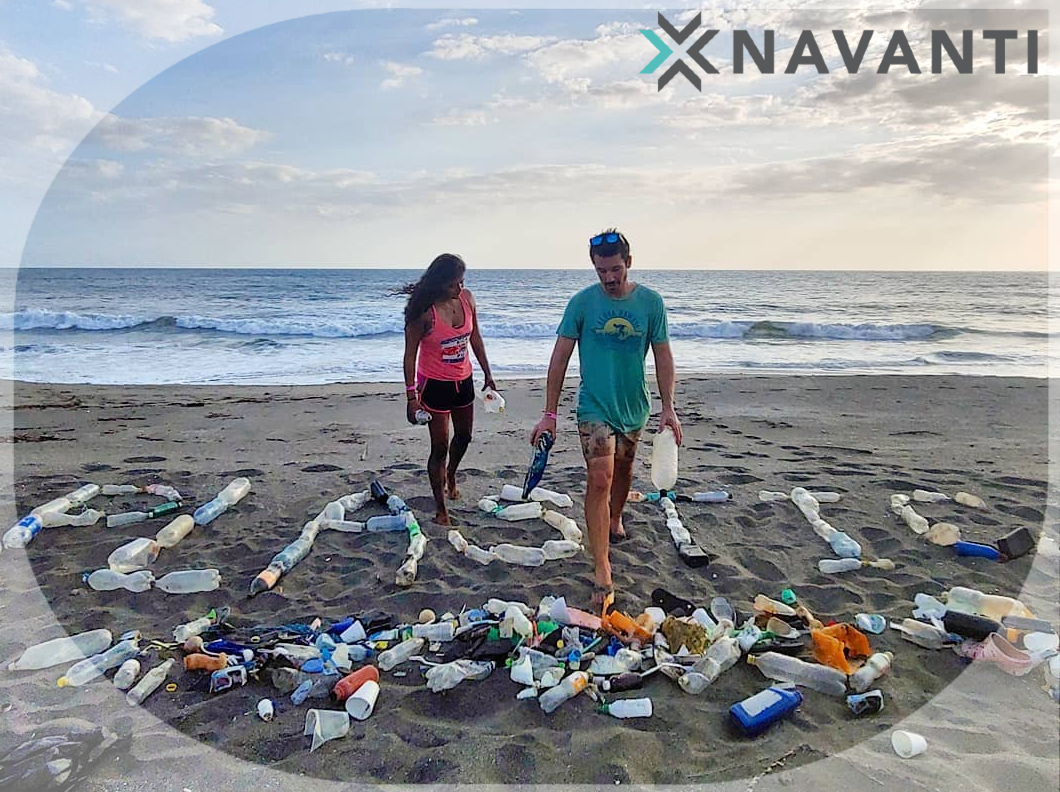By Brock Boven, Geographic Information Specialist @ Navanti Group
Most individuals are concerned with sorting their waste and recyclables and keeping community spaces trash-free and eco-friendly. This is commendable, but society is missing the point entirely. We greenwash our first-world consumption habits and congratulate ourselves when single use plastics find themselves in the glorified recycle bin. We find comfort in mitigation, but it distracts us from the only fundamental solution, ending plastic consumption.
I grew up in a smallish town in southern Michigan. Besides the occasional two-foot blanket of snow in winter, the streets were quite clean. The parks lain with lush green grass in summer, and wooded walking trails with nothing but fresh fallen leaves in autumn. No trash, no plastic. I took up recycling at a young age and scolded my parents for throwing out the occasional can, box or plastic bottle. I don’t ever remember questioning the reliability or efficiency of the recycling system in the United States, until about six years ago.
In 2014, I traveled to India for a three week visit that would alter the course of my life for the next several years. India is beautiful and simulating, with its sights, sounds, tastes and smells contributing to its sensory overload experience. Still, India is not without problems. Poverty and pollution push the limits of human comprehension. Trash lines streets, overflows neighborhood trash bins, burns in heaps in empty lots, and turns nature’s waterways into flowing landfills. I left India paralyzed by many questions, few answers and zero remedies. How did humanity become so careless with the environment? Was the rest of the world also polluting this way? And were developed countries like the US hiding a dirty secret?
Since India, I’ve stamped 20+ additional countries in my passport, the majority developing. My travel has been the ultimate awakening, a quest to find answers and possible solutions. I drifted through South and Central America for seven months. Plastic pollution is in every corner of this magnificent Earth, and not just where humans dot the scene. Plastic bottles float down rivers like an invasive species in Nicaragua and birth themselves into open waters of the Pacific Ocean. Plastic fibers rain down from the sky onto ancient glaciers. Plastic bags choke marine life and settle themselves at the midnight depths of every ocean floor. A conveyor belt of vibrant microplastics wash up onto isolated, pristine, white sand beaches of the Galapagos. Sadly, I can only recall one beach, in a collection of hundreds, where plastic didn’t catch my eye.

The last couple years, when not drifting, I’ve settled in Hawaii. Living on a tiny spec in the middle of the vast Pacific is quite humbling. The island of Maui and its 150,000 residents don’t generate a huge amount trash. Strolling the beaches of the north shore, you’d think otherwise. Fishing nets and lines, clothing, bottles, food wrappers, hygiene products, plastic piping and other endless variations of plastic biproduct mark the shoreline. Most of these items aren’t native to Hawaii. They travel the open ocean from all over the world and find new homes inside unfortunate marine life and on remote beaches. A 30-minute beach cleanup can haul in several kilos of plastic waste. The world of environmental activism can be taxing on your mental and emotional health. You find motivation in the innocent lives saved, yet face dark moments when confronted with the epic scale of the crisis at hand. Billions of pieces of plastic are currently sloshing around oceans and seas. Millions of marine animals die each year as a result. A worldwide cleanup solution is naïve. We’ve reached the point of no return; the damage is permanently woven into the history of our living generations.
I eventually researched and discovered the United States’ corrupt, dirty secret. In my lifetime, only 9% of all plastic waste has been recycled. The rest is landfilled, burned or quietly disappears via mass shipments to other parts of the world. The overwhelming majority of US recyclable plastic waste exports were imported by China until a ban imposed in January 2018. Over the course of 2018, the US diverted the equivalent of 68,000 shipping containers of its parasitic plastic problem to poor, underdeveloped countries around the world. Cleanliness in the developed world is not congratulatory to innovation, but rather to clever rug sweeping that keeps us blindly optimistic. Plastic pollution has spread like a global pandemic and recycling is possibly the grandest lie we’ve ever been told in the realm of sustainability.

For individuals, we must limit plastic consumption and switch to reusable options. For corporations, we must hold them accountable for decades of product waste. For the US, we must contain our own problems and end the global abuse. For humanity and the future of this planet, we must turn off the plastic production tap.
Brock Boven is a GIS specialist at the Navanti Group. He has studied Geography (bachelor’s) and GIS (master’s) with an emphasis in climate, environment and sustainability. Years later, he pursued a lifestyle of nomadic minimalism, and eventually fell into his current passion of environmental activism. Today, Brock temporarily lives in Maui, Hawaii, which allows for involvement in beach cleanups, marine life conservation and climate change awareness.
Instagram: @sustainabledrifter

